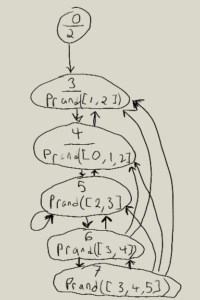This is part 3 of a series about how I created my album Christmaswave. Previously, part 1 posted a list of questions and answered the first two of them: ‘What sample am I going to play?’ and ‘How many times am I going to divide it in half?’. Part 2 answered the question, ‘Once it’s chopped into little (or not-so-little) pieces, which one of them am I going to play?’
One thing I’ve talked about in both posts is balancing a desire for predictability in running the code and in allowing for random variation. This may seem strange for a studio album, but with my previous Christmas album, 12 Days of Crimbo, I did end up playing one of the pieces, Little Dubstep Boy live at an algorave in Birmingham, so it is possible some of these pieces may have a live afterlife.
Perhaps more importantly, allowing for variation allows the discovery of good juxtapositions, which can be made more likely in subsequent revisions of the code. It also makes making the pieces themselves more interesting. Listening to the same thing over and over again in a DAW can get tedious, but subtle changes give something to listen carefully for, keeping one’s ears fresh. I have way more skill in coding pieces than trying to piece them together manually and allowing randomness is an important part of my process.
What speed am I going to play the next bit at?
Having decided which sample to play, how small to chop it up and which subsection of the sample to play, the next question is what speed to play it back at. This is a question the rate at which I playback the buffer, such that both speed and pitch are effected.
A lot of the Vaporwave I’ve listened to seems to play back their samples at slower than the original speed. It also sometimes switches speeds, so that both pitch and timing jump. I like this effect and chose to copy it.
I thought of the timing changes in terms of scales. In Just Intonation, scale steps are given as fractions between the ratios 1/1 and 2/1, where 2/1 is one octave higher than 1/1. Because I wanted slower speeds, I adjust downwards, so that the ratios I used were either between 1/2 and 1/1 or between 1/4 and 1/2. These ratios can then be used directly as the rate parameter in a PlayBuf.ar ugen.
Obviously, almost all of the source material is in 12TET – that is to say: 12 tone equal temperament, the tuning one finds across the white and black keys of a standardly-tuned piano. Any tuning I apply on top of that is more or less in conflict with the original. This can be minimised by only using one rate at a time and repeating it across several subsequent bits. By sticking to one rate for a while, a change later on becomes roughly analogous to a key change. It would have been possible to have a set of sensible key changes that work with the standardised harmony conventions of the original song, but this is not what I did.
Long story short: I picked some scales and tunings
The first piece I worked on, Have Yourself a Scary Christmas is based on Have Yourself a Merry Little Christmas, sung by Judy Garland. That piece and especially that performance of the piece has quite a bit of emotional complexity. The ambiguity of the piece is apparent even in the title, which is not ‘Have a Merry Christmas’, but a more emotionally strangled ‘Have Yourself a Merry Little Christmas’, like someone trying unsuccessfully to be friendly to an ex they’re desperately not over. The music itself is ambiguous about whether it’s in a major key or in it’s relative minor. Garland’s performance adds to this further, soundling slightly drunken and sliding the tuning around in a way that sounds like she’s papering over crushing unhappiness. This effect is especially apparent if you listen to the song slowed down by a factor of 4 with Paulstretch.
In order to draw out the sadness a bit, I used a Romainian minor scale. This is part of the included scale library that comes with the SuperCollider Scale object. I then randomly picked ratios from the scale.
\scale, Scale.romanianMinor(\just),
\rate, Pfunc({|evt|
var scale, degree, rate;
scale = evt[\scale];
degree = (Array.series(scale.ratios.size, 0, 1) ++ [0, 0, 0, 0, 1, 1, 1, 2, 2, 3]).choose;
rate = scale.ratios[degree] * [0.25, 0.5, 0.5].choose;
rate
})
Support for scales is built into Patterns, but it’s most commonly used to compute frequencies, not playback rates.
Almost all the pieces I made used minor scales. I used trial and error to pick which scale worked best with which samples. For all the pieces, I picked degrees randomly and never used anything like a Finite State Machine or a random walk, even those are usually well-suited to picking scale degrees.
In most pieces I repeated the chosen rate, using Pstutter. This is code from Santa Loves You:
\scale, Scale.hungarianMinor(\just),
\degree, Pstutter(8, Pfunc({|evt| evt[\scale].degrees.size.rand}),1),
\rate, Pfunc({|evt| evt[\scale].degreeToRatio(evt[\degree])}) * (2/3),
The Pstutter on the scale degree repeats the degree 8 times before picking a new one with the Pfunc. The rate is calculated from the degree. Because this piece uses voices, I’ve decided to stay closer to a normal playback rate. Using 2/3 instead of 0.5 or smaller means that the samples will sometimes play out faster than their original pitch.
